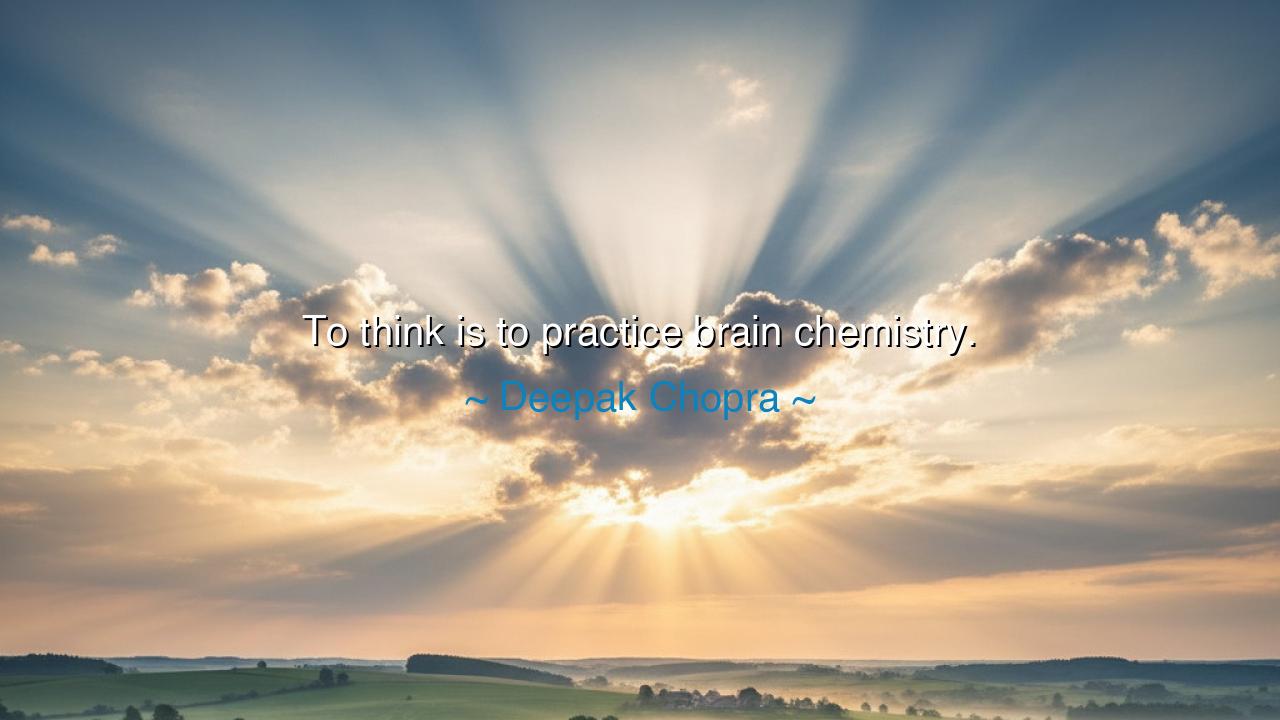
To think is to practice brain chemistry.






“To think is to practice brain chemistry.” Thus spoke Deepak Chopra, the mystic of modern science, who sought to bridge the ancient wisdom of the spirit with the discoveries of the mind. In these few words, he revealed a truth both poetic and biological — that every thought is not merely a whisper in the void, but a force that shapes the very structure of our being. Our ideas, our fears, our hopes — all are etched into the chemistry of the brain, sculpting who we are and who we become. To think, therefore, is not a passive act; it is the art of creation performed upon the canvas of the self.
Chopra’s insight springs from the meeting of two great rivers — the science of neuroscience and the philosophy of consciousness. Modern research shows that every thought releases a cascade of neurochemicals, altering the body’s balance of hormones, neurotransmitters, and energy. Yet long before science spoke of serotonin and dopamine, the sages of old taught that thought molds destiny. The yogis of India, the philosophers of Greece, and the mystics of the East all declared that as a man thinks, so he becomes. Chopra merely translates this ancient wisdom into the language of the modern age: to think is to perform a sacred alchemy upon the mind itself.
Consider what this means for the human soul. Each thought you harbor is like a seed cast into the garden of your body. A thought of anger poisons the soil; a thought of love heals it. When you dwell on fear, the brain floods with stress hormones; when you meditate on gratitude, it releases harmony and peace. The brain, that miraculous organ, does not distinguish between imagination and reality — it believes what you repeatedly tell it. Thus, the practice of thought is the practice of transformation. To think wisely is to heal; to think carelessly is to wound. Every moment, with every thought, we write the story of our own chemistry — and, in doing so, the story of our lives.
History itself bears witness to this truth. Viktor Frankl, the psychologist who survived the horrors of the concentration camps, taught that man’s ultimate freedom lies in the power to choose his thoughts, even in suffering. Surrounded by cruelty and despair, he kept his mind fixed upon meaning and purpose. That choice — that practice of thought — kept his spirit alive when many perished. Later, he wrote that those who could find meaning in their pain endured far more than those who surrendered to hopelessness. His example proves what Chopra declares: that thought is not abstract, but chemical, spiritual, and creative — the key to life itself.
To think is to shape energy, for the mind and body are not separate realms, but two sides of one truth. When your thoughts are luminous, your body follows with vitality; when your thoughts are dark, your strength wanes. The wise understand that the mind is a forge, and every thought is a hammer that strikes the metal of the soul. If you wish to know peace, you must practice it first in the sanctum of your thoughts. If you desire courage, you must think courageously, even when fear whispers otherwise. For the mind is the source of all beginnings, and the chemistry it creates flows outward to touch every cell, every heartbeat, every breath.
Yet there is more to Chopra’s teaching than the science of the mind. He reminds us that thinking is a discipline, a daily act of self-mastery. Just as one trains the body through movement, one must train the brain through awareness. The untrained thinker is like a musician playing out of tune, unaware that each note resonates within his being. But the conscious thinker — the one who watches his thoughts, who selects them with care — becomes the composer of his own symphony. His life vibrates with harmony because his mind is disciplined in beauty, compassion, and purpose.
Therefore, O seeker of wisdom, take this lesson to heart: your thoughts are not idle winds, but the architects of your destiny. Choose them as a craftsman chooses his tools — with reverence and intention. When anger rises, breathe before you speak. When doubt appears, replace it with gratitude. When despair visits, remind yourself that the very act of thinking hope can change the landscape of your mind. The alchemy of thought is the highest art of life; it turns fear into faith, confusion into clarity, and sorrow into strength.
So remember the words of Deepak Chopra: “To think is to practice brain chemistry.” You are not a passive observer of your mind — you are its sculptor, its healer, its creator. Guard your thoughts as you would guard your life, for they are one and the same. Think with kindness, think with courage, think with truth — and you will reshape the very substance of your being, until your mind becomes a vessel of peace and your life a reflection of the divine intelligence that made you.






AAdministratorAdministrator
Welcome, honored guests. Please leave a comment, we will respond soon